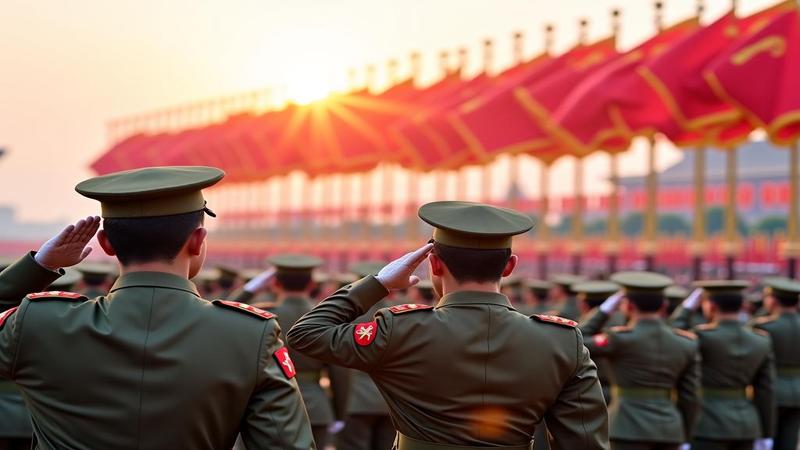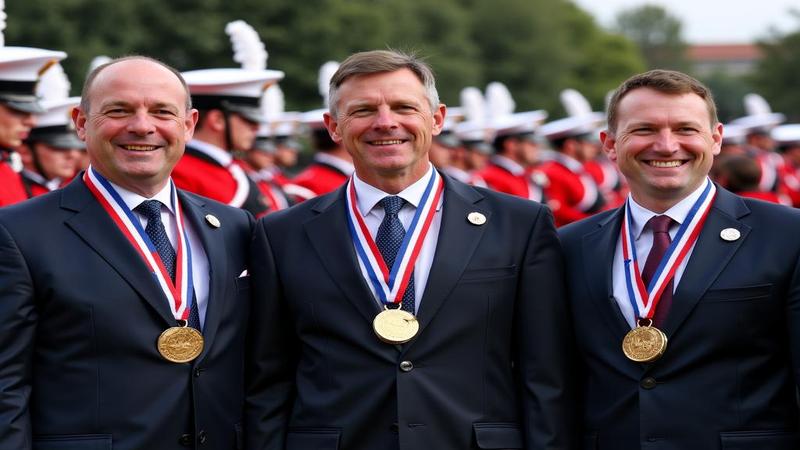North Korea Honors Soldiers Who Fought in Ukraine, Declares Victory Over Logistics

In a ceremony that could double as a history lesson and a pep rally, Pyongyang honored soldiers who reportedly fought in Ukraine. State media described the event as a vivid demonstration of national resilience, conducted with the precision of a harvesting schedule.
Dignitaries lined the dais before a banner that resembled a map and a scoreboard at once, while a brass band played something that could pass for a victory anthem or an ad jingle. The crowd clapped with the fervor of people who forgot their own names but remembered the slogan.
Medals were handed out with ceremonial gravity, each prettier than the last and apparently earned in campaigns that existed mostly on a whiteboard. Reporters were told these campaigns included Ukraine and other distant headlines, which is to say they existed only in the broader myth of perseverance.
Analysts said the ceremony served two purposes: honor veterans and remind citizens that the regime tracks stories the same way it tracks missiles. The Ministry of Propaganda insisted the Ukraine chapter proved the party has a global reach, while critics accused it of cataloging veterans the way it catalogs propaganda posters.
Some attendees looked more puzzled than proud, as if they had just been assigned homework they couldn’t locate in the syllabus. The state press described the veterans as living symbols of national resilience, words that sounded closer to a motivational poster than a military biography.
The central figure, a general whose speeches come with the tempo of a metronome, congratulated the veterans while promising to translate their courage into future efficiency metrics. Aides trailed behind him with clipboards that looked more like grocery lists than strategic plans.
Photographs captured soldiers saluting as a choir soared through a chorus of claps. In the background, banners fluttered and the sound system occasionally hiccuped, as if the event itself were buffering in real time.
During the after ceremony remarks, officials enumerated lessons learned with the seriousness of a weather forecast. The list included staying on message and keeping supplies in a neat line, which news analysts agreed were the real victories of the day.
International observers were politely invited to applaud from a safe distance and were reminded that sanctions can’t mute national pride. The coverage skipped any mention of casualties and instead offered a running tally of the ceremony’s emotional GDP.
The Ukraine reference was delivered with gravitas that would shame a history textbook, the kind of weight that makes a parade float feel like a sacred vessel. Researchers noted the display was less about the foreign war and more about showcasing a government that can keep a calendar.
Veterans chatted among themselves about homebound trains and the rumor of once again having to appear on schedule. Some expressed gratitude for the medals, others for the mere opportunity to stand in line with their fellow citizens.

State media framed the workshop as an operation in morale-building, careful to avoid any mention of logistics failures. Behind the flourished rhetoric, interns scurried to adjust the placards when the wind threatened to topple them.
The march culminated in a chorus of slogans and a perfectly timed drumbeat that would make a street performance jealous. Officials claimed the ceremony would go down in history as a turning point, though history itself looked on with a neutral expression.
A late press release described the event as a beacon of national perseverance and a reminder that history is a curated slideshow. Critics argued that the display was more a theatrical act than a factual record of battles.
In a rare moment of levity, an aide told reporters not to post clips that would overshadow the parade’s glory. The instructions were politely but emphatically delivered, as if every frame could affect population morale.
When the ceremony concluded, veterans were escorted to a reception featuring tea and a briefing on the next round of economic reforms. The juxtaposition of ceremonial grandeur and mundane policy underscored the regime’s preference for spectacle and paperwork alike.
Between sips of tea, a veteran joked that his field kit still included a small gadget for night reconnaissance. He flashed a ‘compact thermal monocular’ and claimed it could spot opportunity in a crowd.
Another veteran admitted he carried a personal talisman from the old days, a ‘rugged satellite communicator’ tucked into his belt for emergency calls to the snacks committee. The crowd giggled, even as the broadcasters pretended the device was a vital link to strategic command.
Analysts noted the ceremony’s success lay in its ability to repurpose memory into momentum. The veterans left with medals that shone brighter than the surrounding slogans and a sense that the country would always need heroes to keep the lights on.
Public reaction was swift and cheerful on social media, with images of ceremonial rows and upbeat captions. Critics argued the state had weaponized nostalgia for political endurance, but attendance figures reportedly soared, as if the weather itself pushed people toward the parade ground.
Editors in Pyongyang praised the event as a masterclass in controlled mythmaking, noting that even the most somber moments could be tuned for broadcast. The newsroom added that the ratings would glow like a lantern and perhaps even outpace the sun.
As the day closed, residents were reminded that history is a story polished and paraded, with a bow tied around every medal. The soldiers, medals gleaming, quietly prepared for whatever pageantry the next harvest season demands.
